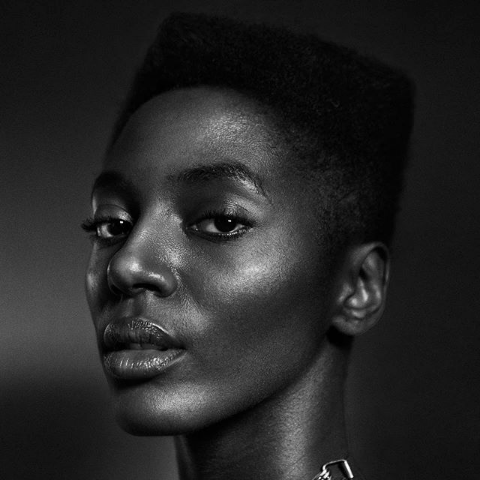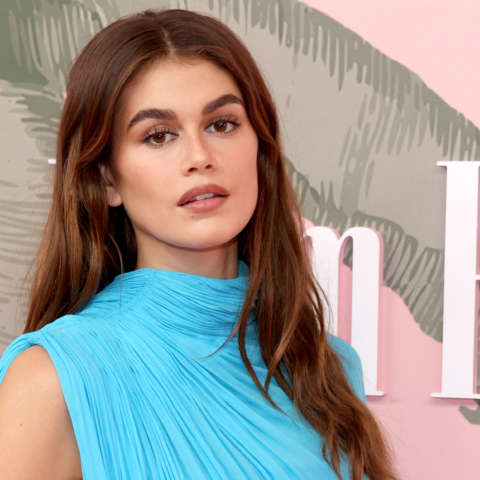Yrsa Daley-Ward, One of the Poets Commissioned For Valentino’s Fall 2019 Show, On Her New Book
"Now young people are writing poetry, which is awesome! Even a few years ago it was like ‘ugh poetry, that’s so boring.’ A lot has changed."
For Fall 2019, Valentino—a label that under Pierpaolo Piccioli’s guidance has already become synonymous with a kind of dreamy romance—dialled the mood for love up a notch. The designer commissioned four contemporary poets to contribute to an anthology of love poems that showgoers found on their seats at the venue. Snippets from their contributions to this ‘On Love’ booklet found their way on to the clothes Piccioli sent down the runway: “printed or embroidered inside coats, on mid-layers of tulle dresses, inside bags and boots—so that only the wearer would know they are there,” reports Vogue.
The four poets Piccioli worked with are Greta Bellamacina, an author who was short-listed for Young Poet Laureate of London in 2014; Mustafa The Poet, who has co-written songs with Drake and The Weeknd; Robert Montgomery, a poet/artist who translates the written word to large-scale installations; and Yrsa Daley-Ward, acclaimed author of Bone and The Terrible who first garnered world recognition via her poetry on Instagram. Read on for our interview with Daley-Ward from last summer, ahead of the release of her book The Terrible.
Yrsa Daley-Ward’s memoir The Terrible is not an easy read, despite—or maybe because of—the way it addresses her past struggles with depression, body image, sexuality, alcoholism and drug abuse with an almost detached air. The first non-poetry book by the soft-spoken UK-born half-Nigerian/half-Jamaican poet, whose poems have brought her over 150K followers on Instagram, this work focuses on what she considers universal themes: “love, relationships, mental health, family, sensuality, human nature,” she says. During her brief Toronto stop promoting the new book, we meet at an airy downtown hotel to chat about the process of writing this memoir, being authentic on social media, and why she loves the growing trend of Insta-poetry.
I read somewhere that you never expected to write a memoir. What’s particularly interesting about this book is that it’s part-poetry, part-prose; it goes back and forth. Is that something you’d thought consciously about?
No, and I didn’t think about it consciously in the making of it, that’s just how it came out. I just kind of sit there and get out of the way and allow things to flow through and that was the form that it took. In any art, whether you’re modelling or acting in front of a camera or painting, you just have to let go. You just gotta trust yourself and the process and the work.
You’ve always bared your soul through your poetry online and the previous book you published. But did this time feel different?
This memoir speaks specifically to experiences that I’ve had, that I might have touched on before but never written about explicitly, and this is an extremely explicit book.
It’s interesting that something that can feel so specific to the person writing it can have universal appeal and resonate with so many different people. How do you explain that?
We’re all going through the same shit! Same stuff, different person. I say this relatively of course. But the emotions are… there are no new emotions. We’re all feeling the same things. We know what it’s like to be heartbroken, we know what it’s like to love, we know what it’s like to feel grief, loneliness, despair, depression, all of those things. So yes, a very personal essay or memoir means as much to you as to the person writing it and you feel less isolated.
Since you’ve found so much success on social media, do you find yourself thinking almost visually when you’re writing? Because your words eventually go to a visual platform.
Not everything I write goes there but I do anyway because presentation in art is important. I can see very visually how I want the page in the book to look. Instagram is quite secondary actually. I think about the page and what I want justified to the right, what goes on the left, what’s in smaller font, where the white space comes… the way that you break up a line means the difference in how a line is seen [by the reader].
I’m sure writing is a very cathartic act for you. Are there some things you write just for yourself and some things that you write to share?
It’s not exactly cathartic for me. It’s just expression, and I think the cathartic thing is when I go out into the world and it meets the air, so to speak. But no, I think it’s all for me and it’s all not for me. There’s no distinction.
It’s incredible because words and poetry are like bridges that connect us together and help us feel less isolated in whatever’s going on and that’s a really great feeling. I like to feel seen just as much as anybody else, and when I read or watch a film and feel moved by something, it’s one of the best feelings, the feeling of being alive.
Do you have any advice for young people that want to get into poetry or any other literary form?
The only advice I can ever give is just do it. Just do it and try to put all the worries about it out of your mind and just commit to doing it. Trust in it completely because your instincts are good. The people who trust themselves often make the most wonderful and unique works and the most poignant works. If we look at the Beat poets and the way that they wrote – it hadn’t been done like that. You’ve always got to start new things and not be afraid if that looks strange. There’s a reason your spirit has asked you to do it that way.
The words ‘authenticity’ and ‘vulnerability’ have become such buzzwords in social media. Do you find yourself thinking about that at all when you’re writing? Because those two words define your work.
The reason why they probably define the work is because I don’t think about it. Authenticity and vulnerability… it has to be natural and you have to want to give it. You can’t be thinking ‘how do I make this more authentic?’ It just is. The less you think and the more you feel is golden.
How do you explain the surge in popularity of Insta-poetry? It’s become cool in a way that poetry never used to be.
Which is wonderful. Because now young people are writing poetry, which is awesome! Even a few years ago it was like ‘ugh poetry, that’s so boring.’ A lot has changed. It’s very exciting. I look at a lot of poetry accounts that are 14 or 15-year-olds writing poetry, it makes me so happy and it’s great stuff. So it’s very encouraging.
But why do you think it captured the fascination of so many people?
Because you can succinctly speak about a very universal subject, and a poem can help somebody feel seen and change their day. They might think ‘oh this is exactly how I felt this morning or how I’m feeling now.’ And the platform is as good a way as any of sharing.
Since you put so much of your own personal life and insecurities and experiences into your work, is there ever something you feel like you’re not ready to broach?
Not after writing this book! There’s really nothing left. It’s a wonderful position to be in because it’s helped me feel fearless.
The truth is freeing at the end of the day.
It absolutely is. I don’t think I understood that in its full capacity until writing this book and putting it out there.








